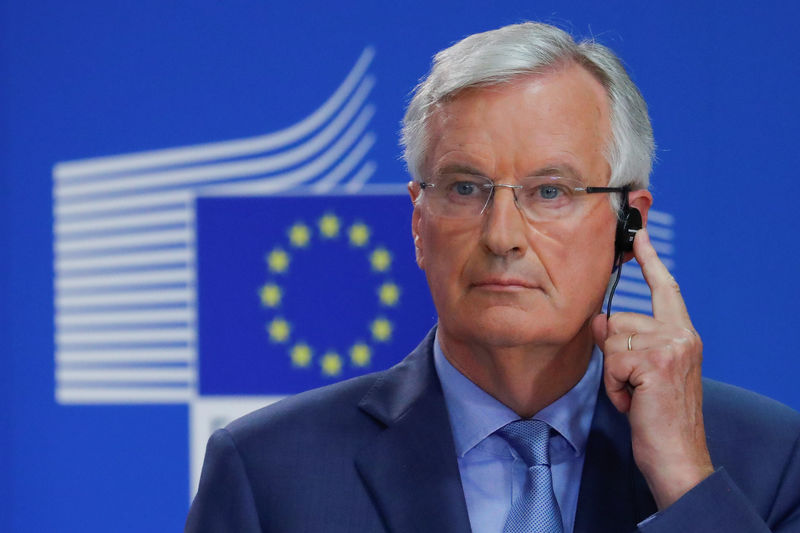 © Reuters. Britain’s Secretary of State for Exiting the European Union Dominic Raab and European Union’s chief Brexit negotiator Michel Barnier hold a joint news conference in Brussels
© Reuters. Britain’s Secretary of State for Exiting the European Union Dominic Raab and European Union’s chief Brexit negotiator Michel Barnier hold a joint news conference in BrusselsBy Jan Strupczewski and Alastair Macdonald
BRUSSELS (Reuters) – EU Brexit negotiator Michel Barnier rejected key elements of Britain’s new trade proposals on Thursday even as he and his new British counterpart Dominic Raab voiced a shared determination to reach a deal by October.
At a joint news conference with the Brexit secretary after three days of talks among officials in Brussels, Barnier made clear British offers to collect customs duties for the EU as part of efforts to avoid friction on Northern Ireland’s new EU border had failed to convince already skeptical Europeans.
“The EU cannot and … will not delegate the application of its customs policy and rules, VAT and excise duty collection to a non-member, who would not be subject to the EU’s governance structures,” Barnier said. “Any customs arrangements or customs union … must respect this principle.”
“The UK wants to take back control of its money, law, and borders. We will respect that,” he said.
“But the EU also wants to keep control of its money, law, and borders. The UK should respect that.”
Barnier added that Prime Minister Theresa May might instead offer to join a customs union with the EU, although that would prevent London cutting its own trade deals with other countries. May has ruled out a customs union and Raab said Britain still believed it could reach a deal to avoid a “hard border”.
Negotiations to provide an outline of how trade will work between Britain and the EU after Brexit next March and, more particularly, after the end of a status quo transition in 2021, have become tangled up with resolving the Irish question, which Brussels says must be done in a pre-Brexit withdrawal treaty.
Raab said his officials had answered EU counterparts’ concerns on the customs plan, part of a White Paper which May pushed through her cabinet at the expense of the resignation of Raab’s predecessor and fellow Brexit campaigner David Davis.
At the heart of the conundrum lies an EU insistence that the way to avoid a “hard border” is for Northern Ireland to follow EU rules as in Ireland and, if need be, different from those on the British mainland, while May rejects new barriers to goods moving from the mainland to the troubled province.
Raab said he believed a so-called “backstop” clause in the treaty on Ireland could be agreed, though he said Britain would insist it was not valid forever – something Barnier says it must be in case Britain’s promised better proposals do not work.
“With pragmatism on both sides I am confident we can find a way to resolve it into a workable solution and that will be easier to achieve if the backstop, if it were to be exercised at all, could only be for a time-limited period before the future arrangements become operational,” Raab told reporters.
Barnier, however, said the talks this week had failed to convince him: “We have no objections in principle to this,” he said of what he calls an “all-UK backstop”.
“But,” he added, “We have doubts that it can be done without putting at risk the integrity of our customs union, our common commercial policy, our regulatory policy and our fiscal revenue.
“We have had an open and frank and therefore useful discussion with Dominic on these issues. I think the UK has understood our concerns and respects our principles and the UK had promised to come back to us with concrete proposals on how to address our concerns.”
Both men said negotiations would resume in mid-August – normally a time when the EU institutions are closed for summer holidays – and would continue weekly thereafter.
Source: Investing.com



























